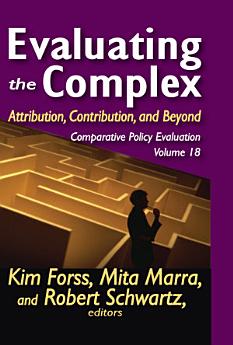Evaluating the Complex: Attribution, Contribution and Beyond
About this ebook
The book begins with a theoretical and conceptual explanation of the process and shows how this translates into the practice of evaluation. The chapters cover a wide variety of subjects, such as poverty, homelessness, smoking prevention, HIV/AIDS, and child labor. The use of case studies sheds light on the conceptual ideas at work in organizations addressing some of the world's largest and most varied problems.
The evaluation process seeks a balance between order and chaos. The interaction of four elements—simplicity, inventiveness, flexibility, and specificity—allows complex patterns to emerge. The case studies illustrate this framework and provide a number of examples of practical management of complexity, in light of contingency theories of the evaluation process itself. These theories in turn match the complexity of evaluated policies, strategies, and programs. The evaluation process is examined for its impact on policy outcomes and choices.






